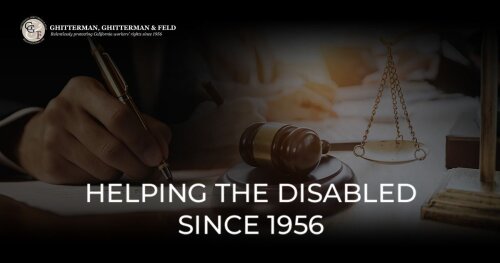Best Job Discrimination Lawyers in Vermont
Share your needs with us, get contacted by law firms.
Free. Takes 2 min.
Or refine your search by selecting a city:
List of the best lawyers in Vermont, United States
About Job Discrimination Law in Vermont, United States
Job discrimination occurs when employers treat employees or job applicants unfairly because of certain protected characteristics such as race, gender, age, disability, sexual orientation, or religion. In Vermont, both federal and state laws provide robust protection against workplace discrimination. These laws apply to hiring, firing, promotions, compensation, job assignments, training, and other terms and conditions of employment. Vermont aims to foster workplaces that are fair and inclusive, ensuring that everyone has an equal opportunity to earn a living free from discrimination.
Why You May Need a Lawyer
There are several situations where someone facing job discrimination in Vermont may need legal help. If you believe you were wrongfully terminated, denied a promotion, harassed, or retaliated against because of your race, gender, disability, age, religion, or another protected status, an attorney can help assess your case. Lawyers are also critical if you have tried resolving discrimination internally with your employer but have not received a satisfactory result, or if you are facing complicated procedural requirements to file a complaint with government agencies. Sometimes, discrimination is subtle or difficult to prove, and a knowledgeable lawyer can help gather and present evidence, negotiate on your behalf, and represent you in court or administrative hearings.
Local Laws Overview
Vermont provides stronger protections against job discrimination compared to some other states. The Vermont Fair Employment Practices Act (FEPA) makes it unlawful for employers to discriminate in regards to race, color, religion, ancestry, national origin, sex, sexual orientation, gender identity, place of birth, age, disability, HIV status, and others. The FEPA covers employers with as few as one employee, making it broadly applicable. In addition to FEPA, federal laws such as Title VII of the Civil Rights Act, the Americans with Disabilities Act (ADA), and the Age Discrimination in Employment Act (ADEA) may also apply.
Vermont law also takes a proactive approach to preventing harassment, requiring employers to provide training and adopt workplace policies. Furthermore, whistleblower protections exist for employees who report legal violations or participate in investigations. Victims of discrimination can file complaints with the Vermont Human Rights Commission or the Equal Employment Opportunity Commission (EEOC), sometimes simultaneously. Remedies may include reinstatement, lost wages, compensation for emotional distress, and changes in workplace policies.
Frequently Asked Questions
What constitutes job discrimination under Vermont law?
Job discrimination occurs when an employer takes negative action against an employee or applicant because of a protected characteristic, such as race, gender, disability, sexual orientation, or age. This can affect hiring, firing, compensation, job assignments, training, or workplace environment.
Who is protected by Vermont's anti-discrimination laws?
Almost all employees and job applicants in Vermont are protected, regardless of the size of the employer. State laws cover a wide range of protected classes, including but not limited to race, color, religion, ancestry, national origin, sex, sexual orientation, gender identity, age, disability, and HIV status.
What should I do if I believe I have experienced job discrimination?
Document the incidents as thoroughly as possible, including dates, times, witnesses, and descriptions. Report the problem to your employer or human resources department if possible. If the issue is not resolved, consider filing a complaint with the Vermont Human Rights Commission or the EEOC, and consult a lawyer for advice.
How long do I have to file a discrimination complaint in Vermont?
You generally have 300 days from the act of discrimination to file a complaint with the Vermont Human Rights Commission or the EEOC. Timelines may vary, so it is important to act promptly.
Can I be retaliated against for reporting discrimination?
No. Both state and federal laws protect employees from retaliation for reporting discrimination or participating in investigations. If you face retaliation, this is a separate violation and should be reported.
Is sexual harassment considered a form of job discrimination?
Yes. Sexual harassment is a type of discrimination based on sex or gender and is prohibited under both Vermont law and federal law.
Does Vermont law protect LGBTQ employees against discrimination?
Yes. Vermont law specifically prohibits discrimination based on sexual orientation and gender identity in employment.
Can job discrimination laws apply to independent contractors or only employees?
Most protections apply to employees, but some legal remedies may also exist for independent contractors, depending on the circumstances. It is best to consult with a lawyer for specific advice.
What remedies are available if I win a job discrimination case?
Possible remedies include reinstatement to your job, back pay, compensatory damages for emotional distress, attorney fees, and changes to the employer's policies or training. Each case is unique.
Do I need a lawyer to file a discrimination claim?
While it is possible to file a claim on your own, a lawyer can greatly improve your chances of success by helping you navigate the process, gather evidence, and advocate on your behalf.
Additional Resources
- Vermont Human Rights Commission: An agency that investigates complaints of discrimination in employment and provides information about your rights.
- Equal Employment Opportunity Commission (EEOC): The federal agency that enforces anti-discrimination laws nationwide.
- Vermont Department of Labor: Offers information about workplace rights and resources for employees.
- Legal Aid of Vermont: Provides free or low-cost legal assistance to qualifying individuals facing workplace discrimination.
- Law Libraries and Self-Help Centers: Local libraries and online portals may have resources about employment discrimination laws and how to proceed.
Next Steps
If you believe you have experienced job discrimination in Vermont, start by documenting all incidents and communications. Review your employer's internal complaint procedures and consider alerting human resources or relevant supervisors. If these steps do not resolve the issue, or if you fear retaliation, contact the Vermont Human Rights Commission or the EEOC to discuss filing a formal complaint. Consulting an experienced employment lawyer is highly recommended, as they can provide tailored advice and represent you through the process. Many attorneys offer free consultations, which can help you understand your rights and potential remedies before taking further action.
Lawzana helps you find the best lawyers and law firms in Vermont through a curated and pre-screened list of qualified legal professionals. Our platform offers rankings and detailed profiles of attorneys and law firms, allowing you to compare based on practice areas, including Job Discrimination, experience, and client feedback.
Each profile includes a description of the firm's areas of practice, client reviews, team members and partners, year of establishment, spoken languages, office locations, contact information, social media presence, and any published articles or resources. Most firms on our platform speak English and are experienced in both local and international legal matters.
Get a quote from top-rated law firms in Vermont, United States — quickly, securely, and without unnecessary hassle.
Disclaimer:
The information provided on this page is for general informational purposes only and does not constitute legal advice. While we strive to ensure the accuracy and relevance of the content, legal information may change over time, and interpretations of the law can vary. You should always consult with a qualified legal professional for advice specific to your situation.
We disclaim all liability for actions taken or not taken based on the content of this page. If you believe any information is incorrect or outdated, please contact us, and we will review and update it where appropriate.
Browse job discrimination law firms by city in Vermont
Refine your search by selecting a city.










